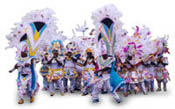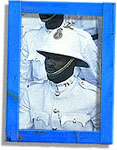Bahamians take great pride in their culture, especially their names, which are indicative of a rich cultural legacy. There are many common names like the Gibsons, reputedly from Scotland; the Alburys, Malones and Russells, said to be Irish Loyalists; and the Eleuthera Bethels, who say they came with those zealous adventurers years ago. It has been said that the Bethels once spelled their name with two 'l's', but removed one because of their religious convictions. The Black Bahamians' roots go back just as far, as evidenced by the many who took the name "Rolle," after Lord Rolle, a wealthy and much-loved planter in Exuma who, after emancipation, gave his land to his former slaves.
Religion is an integral part of Bahamian life. Even the tiniest village has a church, sometimes two. The people's religious ardor and high regard for education are evidence of their Puritan heritage, derived from the Eleutheran Adventurers. Music is also in the very bones of the people. African rhythms, Caribbean Calypso, English folk songs and the uniquely Bahamian Goombay beat echo in the air. The fast-tempoed "goom-bahhh" resonating from the drums can be traced back to the days of slavery and is used both for story-telling and dancing.
 The Bahamian festival of Junkanoo is an energetic,
colourful parade of brightly costumed people gyrating and dancing to the rhythmic
accompaniment of cowbells, drums and whistles. The celebration occurs on December
26 and January 1 -- beginning in the early hours of the morning (2:00 a.m.)
and ending at dawn.
The Bahamian festival of Junkanoo is an energetic,
colourful parade of brightly costumed people gyrating and dancing to the rhythmic
accompaniment of cowbells, drums and whistles. The celebration occurs on December
26 and January 1 -- beginning in the early hours of the morning (2:00 a.m.)
and ending at dawn.
 Junkanoo is reminiscent of New Orleans' Mardi
Gras and Rio de Janeiro's Carnival, but it is distinctly Bahamian and exists
nowhere else. Parade participants -- arranged in groups of up to 1,000 --
are organised around a particular theme. Their costumes, dance and music reflect
this theme. At the end of the Junkanoo procession, judges award cash prizes.
Junkanoo is reminiscent of New Orleans' Mardi
Gras and Rio de Janeiro's Carnival, but it is distinctly Bahamian and exists
nowhere else. Parade participants -- arranged in groups of up to 1,000 --
are organised around a particular theme. Their costumes, dance and music reflect
this theme. At the end of the Junkanoo procession, judges award cash prizes.
The three main categories for the awards are: best music, best costume and
best overall group presentation.
The most spectacular Junkanoo parade occurs in Nassau. However, you can also experience it on Grand Bahama, Eleuthera, Bimini and Abaco. It's held on Boxing Day (December 26) and New Year's Day (January 1) from 2:00 a.m. until 8:00 a.m.
 The legal and political institutions of the
country reflect its Anglo-Saxon heritage. It has a bicameral parliamentary
government composed of a Senate and a House of Assembly, a Prime Minister,
an Attorney General, and an independent Judiciary, including a Supreme Court
and a Court of Appeals. The Changing of the Guard ceremony, held every two
weeks, continues the British tradition, and Bahamian policeman pride themselves
on their starched uniforms. Many will not put on their shirts until they are
on duty to preserve their formal appearance, which is quite impressive.
The legal and political institutions of the
country reflect its Anglo-Saxon heritage. It has a bicameral parliamentary
government composed of a Senate and a House of Assembly, a Prime Minister,
an Attorney General, and an independent Judiciary, including a Supreme Court
and a Court of Appeals. The Changing of the Guard ceremony, held every two
weeks, continues the British tradition, and Bahamian policeman pride themselves
on their starched uniforms. Many will not put on their shirts until they are
on duty to preserve their formal appearance, which is quite impressive.
The laid-back attitude of Bahamians is often misunderstood by those unaware that it evolves from years of a good life in a land where nature provides every need. There is always time to worry about the bad things tomorrow. Bahamians are humorous, helpful people who love to celebrate. Don't get too angry if you want to go shopping and everything is closed. It's probably the Queen's Birthday or some other holiday. Weddings and funerals in The Bahamas are especially important social events. People begin celebrating a marriage weeks before the official ceremony begins, and the passing of loved ones is commemorated by parties long after they are gone.
Bahamian Art |
| Painting Of Eluthra by Eddie Minnis |
| Bay Street (Downtown Nassau) by Eddie Minnis |
| Painting Of Marina by Eddie Minnis |
Bahamian Music |
Note: If you would like to download a music clip from The Bahamas, Click on the FTP link below. |
| FTP Site |